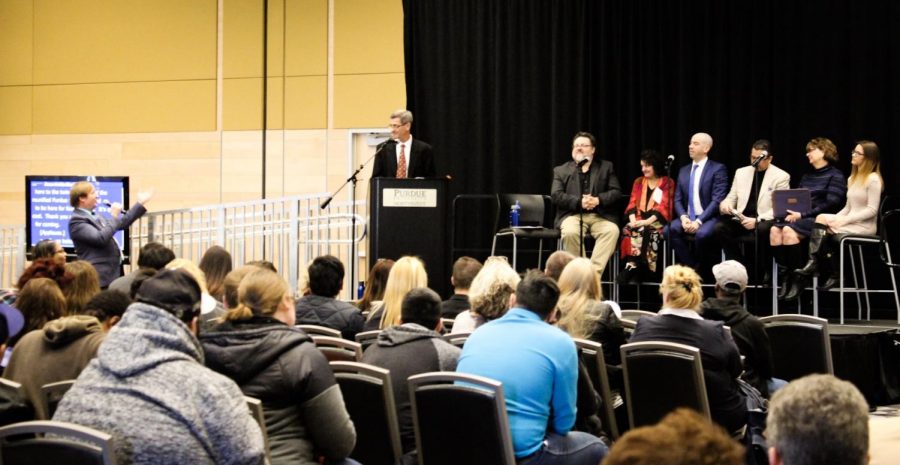Talking trash
‘Garbology’ author speaks at PNW
Dan Wilbur, vice chair of Faculty Senate, asks a question to Edward Humes, Pulitzer Prize-winning author of “Garbology,” during the One Book, One University event on March 2.
Students and faculty gathered at the One Book, One University event to discuss the novel “Garbology” with Pulitzer Prize-winning author Edward Humes on March 1 and 2 at the Hammond and Westville campuses.
Humes expressed his book’s lesson about the wastefulness of humans by lifting up the water bottle in front of him and comparing it to a metal canister he had brought with him.
“This university and everyone I’ve met have been such great hosts, but I got to give you one tip. If you have somebody in to talk about waste, don’t put this on the podium,” Humes said. “The [water bottle is the] single most wasteful product you will ever see. It is so easy to use one of these [reusable water bottles].”
The event was held to discuss the novel chosen for the One University Common Reading program. A different book is chosen each year for incoming students to read and incorporates it into the freshman courses.
According to Humes, an American contributes 7.1 pounds of trash per day to the planet’s waste. He said that the only way to make a difference is for all people to contribute to lowering the trash rate and improving the health of the planet.
“The last thing that I want to talk to you about is how change can be easy,” Humes said. “We’ve made wastefulness a habit, but it is so easy to make nonwastefulness a habit too. It’s how the human brain is.”
Humes joked with attendees during the Q&A when he was asked what PNW can do to change the culture of recycling to make a more sustainable university. He recommended the university stop inviting authors and giving them bottles of water.
“Alright! Point taken!” said Ralph Mueller, vice chancellor for Academic Affairs and provost, who provided the water bottle.
Humes also encouraged reusable materials for meals on campus and increased recycling rates.
To wrap up the Q&A, Harvey Abramowitz, professor of mechanical engineering, said the university has been composting waste as well as recycling. Abramowitz said they want to advance the technology through senior design and research projects, as well as offer more programs to increase the sustainability of PNW.


